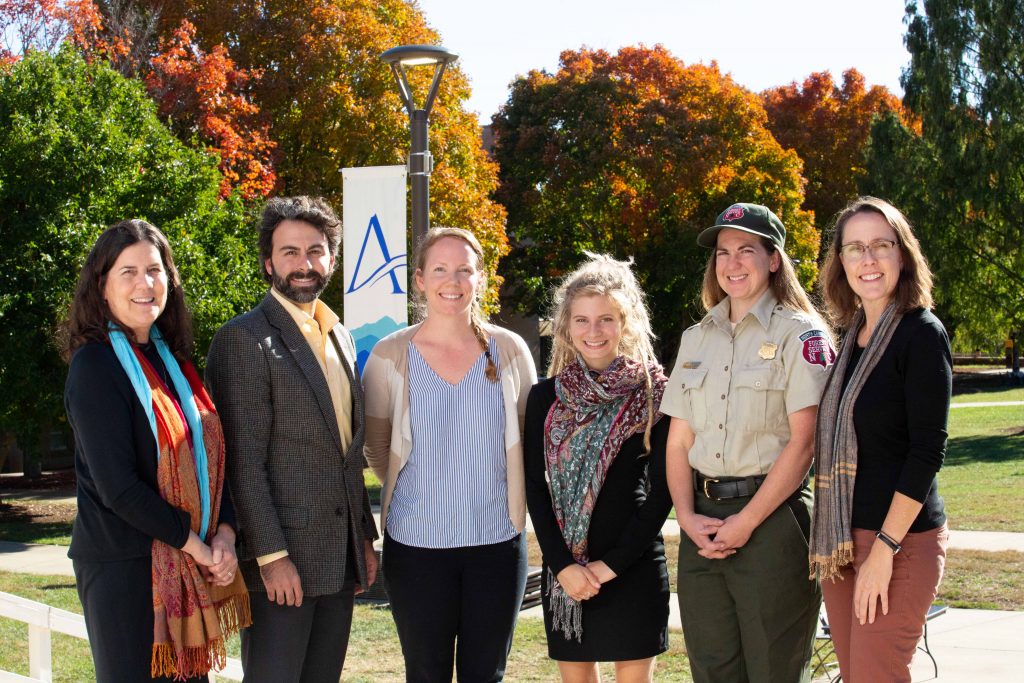Emily Avery fell in love with teaching in one of the most picturesque classrooms in North Carolina: Chimney Rock State Park. She discovered her passion for education while leading guided hikes and teaching school groups about the park’s wildlife through her work as a seasonal naturalist.
Already equipped with a degree in biology and a deep appreciation of the outdoors, Avery decided to pursue a degree in environmental studies and her teacher licensure at UNC Asheville with the goal of educating middle school students in the sciences. Now, with less than a year until she graduates, she’s continued to advance her education by earning her Environmental Education Certification, offered through North Carolina’s Department of Environmental Quality.
“I have a love of science, the outdoors, and nature, and I wanted to learn more about educational strategies to teach kids about the environment and how to protect it,” Avery said. By increasing environmental literacy and stewardship among children and adults, the Environmental Education Certification is another way for educators to invest in the future of North Carolina’s environment.
Certification Connections
While it is self-paced, the certification is in-depth and immersive, requiring 200 hours of workshops, outdoor experiences, teaching, and a community partnership project that connects two organizations. Avery’s work as a naturalist counted towards her certification, and she got a head start on her student-teaching requirements for her teacher licensure by completing her community project. Through The North Carolina Arboretum’s ecoEXPLORE Program, she created and taught five environmental education lessons to students in the IRL (In Real Life) Program at Asheville Middle School. “When students have more opportunities for experiential learning in science, it creates deeper thinking and application of knowledge that can be used in the real world. This certification has provided me with a wealth of information on lesson plans, activities, games, citizen science projects, community involvement, and how to create engaged learning for all students,” said Avery.

UNC Asheville’s Adjunct Assistant Professor of Environmental Studies Alison Ormsby earned her certification this past summer, and uses the tools and strategies she learned in her classes. “I taught a class on Citizen Science and a class on teaching environmental issues, so I’ve hosted workshops for the certification through my classes as well. Emily was able to take two of those,” Ormsby said.
Ormsby was particularly excited to learn that North Carolina offered the certification. “Although I’ve been doing this [teaching environmental education] for 25 years, not all states have this certification. It helped me with networking with other environmental educators in the state, so you meet a lot of people through the workshops and opportunities.”
Ormsby and Avery also connected with UNC Asheville alumna Amy Kinsella ‘08, who is now an education ranger with the North Carolina Forest Service at Holmes Educational State Forest in Hendersonville. Kinsella completed her certification in 2016 and teaches some of the workshops and outdoor experiences.
“We have a covered picnic shelter that is conducive to educating outside, and it allows us to immerse ourselves and the participants in a managed forest, so we can talk about forest management and fire ecology. We can talk about some subjects that people might not be as familiar with, like tree identification in the winter. So it allows us to reach a niche that we’re excited about,” Kinsella said.
Honoring the Achievement
The North Carolina Department of Environmental Quality used to send certificates in the mail, but Secretary Michael S. Regan felt recipients deserved in-person recognition for their time and efforts. He presented Avery’s certificate at UNC Asheville on Wednesday, Oct. 23, overlooking UNC Asheville’s own picturesque Quad on a gorgeous fall day. “Environmental stewardship and environmental education are so important, not only from an educational standpoint, but it’s so integral to our economy and our way of life. It’s an honor to be a steward of this program and have so many people across the state interested in environmental education,” said Secretary Regan. “Without folks like Emily, I think the state would be lagging behind.”
Approximately 674 educators have been certified in the program and are currently active in the field. Emily Avery will put her newly certified skills to work during her student teaching this spring, and in the fall, she hopes, as a full-time middle school teacher. Looking on as Sec. Regan made the presentation was another student who may draw him back to campus next year – UNC Asheville junior Julie Neumark is midway through her “EE” certification and anxious to start making a difference educationally and environmentally.
Please click through for more information about UNC Asheville’s Teacher Licensure Program, and the university’s Department of Environmental Studies.
 N.C. Department of Environmental Quality Secretary Michael S. Regan presents the Environmental Education Certificate to UNC Asheville student Emily Avery, as Chancellor Nancy J. Cable (right) and Provost Kai Campbell (left) look on.
N.C. Department of Environmental Quality Secretary Michael S. Regan presents the Environmental Education Certificate to UNC Asheville student Emily Avery, as Chancellor Nancy J. Cable (right) and Provost Kai Campbell (left) look on.
Share
Permalink: